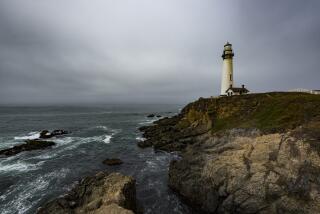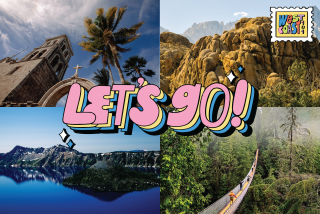In Remote Washington, Old-Timers and Newcomers Live and Let Live
- Share via
BOUNDARY, Wash. — They lock the gate to Canada at 5 p.m.
But in this woodsy corner of northeastern Washington, no one really seems to mind the wait until it reopens promptly at 9 the next morning.
In an emergency, there’s a border crossing open until midnight about 10 miles to the west.
“This part of the country is still kind of backward. I like it that way. It’s why I’m here,” says Charlie Birely, 61, a longtime border resident with a collection of 1930s trucks in the forest that serves as his front yard, a few miles south of the U.S.-Canada line, the longest unprotected border on the planet.
“It’s a very well-kept secret how pretty it is and how nice it is to live up here,” says Richard Jeffrey, who, with his wife, Betty, owns the Waneta Quick Stop, the last U.S. shopping spot on Washington 25.
He reflects momentarily and decides he wants to keep the secret. He suggests a lie: “Tell them how terrible the hunting and fishing is.”
It is at the Boundary-Waneta, British Columbia, border crossing that the Columbia River enters Washington state. Although dammed three times upriver on the Canada side, the river looks wild at this point.
Ten miles south, the Columbia becomes Lake Roosevelt, a 50-mile-long drink of water formed by the world’s largest concrete structure, the Grand Coulee Dam, built in the 1930s for electricity and irrigation.
Indian tribes always and the Northwest’s Catholic bishops recently have called this river sacred. From its headwaters in British Columbia to its mouth at the Pacific Ocean, the Columbia River is a constant in Washington state, connecting the east to the west and the city to the country. It is a 1,210-mile-long source of water, power, transportation, recreation and stunning beauty.
“It’s a beautiful river all the way from here to Portland,” Jeffrey says.
The view at the border is spectacular. The Pend Oreille River splashes into the Columbia. The foothills of the Rockies are green and lush with wildflowers. Moose, bear and deer are common. Crickets chirp and birds sing in the breathtakingly fresh air.
The Jeffreys made the border their home two years ago, a nearly diagonal move across the state from Battle Ground in the southwest.
“We always wanted a little Ma and Pa store,” Betty Jeffrey says.
They bought the Quick Stop--a convenience store, mail drop and community gathering spot where just about everyone can find a friendly word or a helping hand.
“We came up here to retire. We’re retired, right, honey?” Betty asks Richard. “We only work seven days a week.”
There’s a steady stream of customers at the Quick Stop on this warm spring day, regulars and travelers. Canadians scoop up handfuls of U.S. candy. “They’ll come over and buy the Idaho spuds,” Betty says.
Locals look for a lunchtime chat, a leisurely cup of coffee or a comfortable place to smoke a cigarette.
Betty runs a dual cash register with a drawerful of Canadian currency and another of American money, keeping a calculator handy to make the proper exchange. A $2 Canadian coin costs $1.36 U.S.
“It’s like one big happy family here,” Betty says as friends traipse in and out. It’s a bond born of hard winters, distant neighbors, no TV and a shared love of the outdoors.
In winter, women from their 30s to one in her 90s settle at the weathered picnic table in the store’s back room for a night of weekly needlecraft.
“We call it the Stitch-n-Bitch,” Betty says.
It’s the distaff side of the hunting-and-fishing talk that takes place year-round.
Gene Royseth, 57, formerly of Marysville, moved here a year ago after hunting deer in the region for six or seven years. He was drawn by the people and the country, and is at the Quick Stop to check his lottery tickets.
Hobbled by a broken leg, he confesses he broke it building a deck on his house. “No, he was playing trapeze artist,” teases Betty.
A Montana native, Royseth believes the hard winters will keep most of the dreaded “coasties” away from his little piece of paradise.
“We sit here and watch the bears and elk cross the river,” Betty says.
The region is attractive to veterans and artists looking for solitude, along with outdoor enthusiasts and refugees from traffic jams and skyrocketing housing prices in other parts of the Northwest.
A bulletin board in the store advertises a 2,000-plus-square-foot house on 20 acres for $170,000.
There’s a certain tolerance here for personal idiosyncrasies, a live-and-let-live attitude that welcomes those looking for a place to be themselves.
“The best thing, I think, is the people,” Betty says. “It broadens your mind, for one thing, and lets you open up your eyes to what the real world is like. It’s exposure most people don’t get.”
Birely might be one of those people. Originally from Moses Lake, he bounced around much of the United States in the military before settling here.
A cautious but amiable soul with an opinion on almost everything, Birely has been diagnosed with emphysema, but he still rolls his own smokes with nicotine-stained fingers and takes pride in the fact that he receives no state aid. He lives on Social Security.
“We’re Second Amendment folks,” Birely says, pulling aside his shirt to reveal a holstered .44 Special. His big yellow dog, George, trots up to investigate.
A mechanic by trade, Birely reared a daughter--now in college--in a large, rough-hewn, garage-like house where the truck parts are on the kitchen table along with the cereal bowl and his collection of fountain pens.
Guns, long and short, are everywhere. There’s also a pair of grandfather clocks, a rotary-dial telephone and lots of reading material amid the clutter. He can fire rounds at paper targets simply by opening his back door.
“You might want to cover your ears,” Birely warns as the 1860 Civil War Colt revolver booms. “Oh yes, this is not a toy.”
A sign at the driveway proclaims his place “Hooverville, pop. 2,” a reference to the 1930s shantytowns that sprang up during the Depression.
He worries that we are doomed to repeat some of the worst of history.
“We’ve gotten pathetic. We’re a throwaway society,” Birely says. “You make people fat and happy, and you can take away their rights.
“I see people just throwing away their rights. I don’t know what it will take to wake them up.”
But out here in the woods of northeastern Washington, a man or a woman can pretty much do what he or she wants as long as it infringes on no one else’s rights.
“We can do our shooting without any bother,” Birely says. “We all know each other.”
More to Read
Sign up for Essential California
The most important California stories and recommendations in your inbox every morning.
You may occasionally receive promotional content from the Los Angeles Times.













